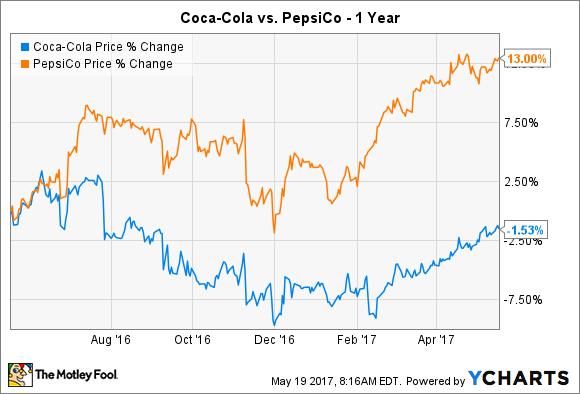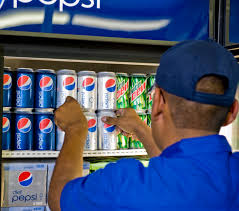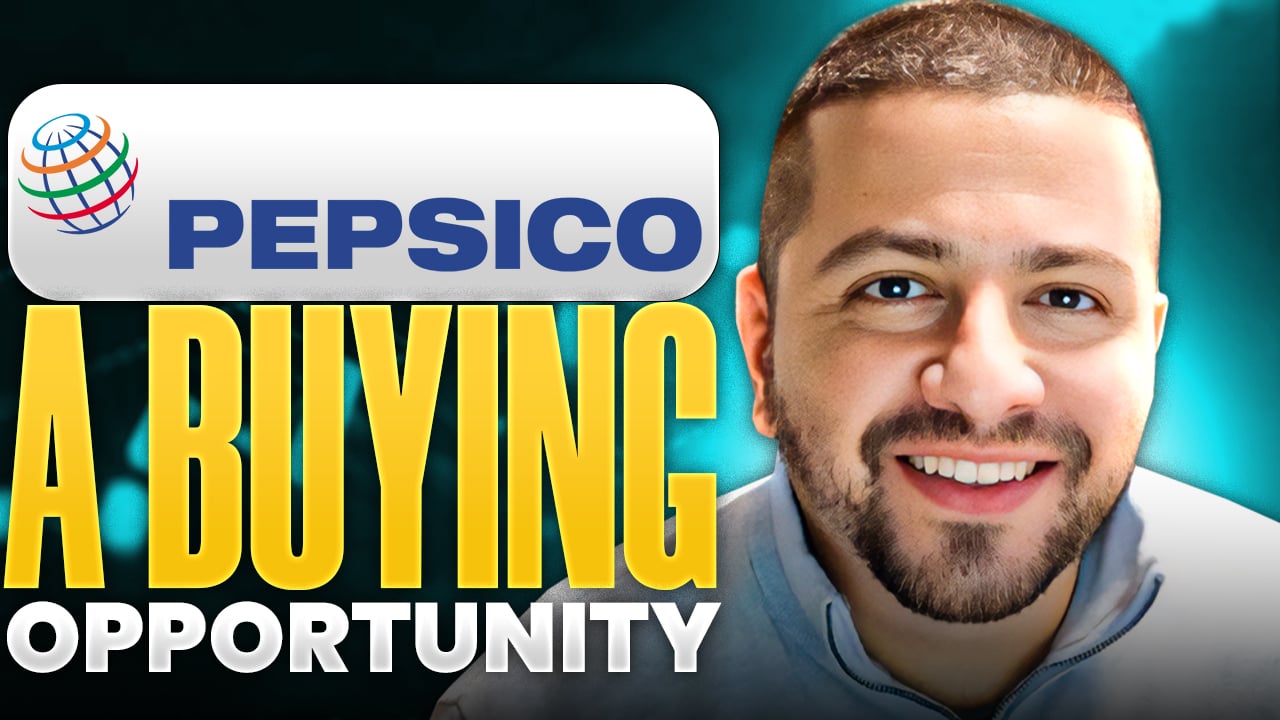Decades ago, PepsiCo (PEP +3.32%) introduced the Pepsi Challenge to compare its namesake sugary cola to Coca-Cola's (KO +1.94%). Consumers remain deeply divided over which beverage giant makes the better cola, and investors also have a lot of different thoughts in how they evaluate the two companies. Coca-Cola offers a purer play on beverages, with sugary soft drinks, juices, bottled water, tea, and sports drinks among its list of products. PepsiCo has most of those drink offerings, but it also includes the hugely popular Frito-Lay snack brand, along with some other food categories that give PepsiCo more diversification. With that in mind, investors want to know which stock is a smarter pick right now. Below, we'll look at Coca-Cola and PepsiCo to see how they compare on some key metrics.
Valuation and stock performance
Coca-Cola and PepsiCo have seen their shares go in different directions over the past year. Not including dividends, Coca-Cola stock has gone down by about 2% since May 2016, while PepsiCo has climbed a healthy 13% over the same period.
Yet even though PepsiCo's stock price has moved up, its valuation remains slightly more attractive based on simple earnings measures. When you look at trailing earnings, Coca-Cola stock trades at a high multiple of 31, and although PepsiCo's corresponding value of 26 times trailing earnings isn't cheap, it's at least a little less expensive. Similarly, when you incorporate future earnings expectations into the mix, PepsiCo weighs in a bit above 20, while Coca-Cola has a forward multiple of more than 22. Based on these numbers, PepsiCo has a significant edge over Coca-Cola.
Dividends
Both Coca-Cola and PepsiCo have strong track records as dividend stocks. In terms of current yield, Coca-Cola has the upper hand, currently yielding 3.4% versus the 2.7% that PepsiCo pays. However, one thing to consider along with yield is payout ratio, or the fraction of current earnings that a company pays out as dividends. PepsiCo's payout ratio is a fairly healthy 65%, giving it free cash to use in reinvesting in the business, stock buybacks, or other useful purposes. Coca-Cola, meanwhile, has a payout ratio closer to 100%, raising questions about the sustainability of the growth in its stock over time.
At least for now, though, Coca-Cola and PepsiCo both have impressive track records of dividend growth. Coca-Cola sports a 55-year streak of annual dividend increases, including its most recent 6% increase earlier this year. PepsiCo also scores well on this front, with a 45-year record of its own that culminated in a 7% increase this year.
With a higher yield and longer streak, Coca-Cola might have a small advantage over PepsiCo with dividends. But the payout ratio disparity helps to balance the scales back toward parity.

Image source: PepsiCo.
Growth prospects and risks
The challenges that the beverage industry currently faces are monumental. That's particularly bad news for Coca-Cola, which has had to deal with more controversy from consumer groups alleging bad health impacts from sugary soft drinks. Indeed, Coca-Cola has been the target of a lawsuit that argues that the drink giant and a beverage industry association worked together inappropriately to mislead consumers. Efforts to respond with smaller serving sizes have gotten a positive reaction from customers, but Coca-Cola's longer-term strategy has to include continued attention to other types of beverages that align more closely with consumer views on healthy living. The company is moving in that direction, but until it makes more progress, recent sluggishness in financial results is likely to continue.
PepsiCo has to deal with some of the same issues, but it has been better about getting in front of the curve on the healthy-living trend. Rather than focusing solely on traditional junk food-style snacks, CEO Indra Nooyi and her team have worked hard to find ways to make PepsiCo's snacks healthier, and that initiative turned out to be prescient. PepsiCo has still been cautious with its financial outlook, especially because its overseas markets haven't been as strong as investors would like to see. By keeping its ambition conservative, however, PepsiCo hopes to put itself in a better position to outpace expectations if things go surprisingly well.
Currently, PepsiCo looks like the better buy for stock investors, with a cheaper valuation, solid dividend characteristics, and better growth prospects. Neither stock is a huge bargain at current levels, but some of the added challenges that Coca-Cola faces put it at a disadvantage compared to PepsiCo.








